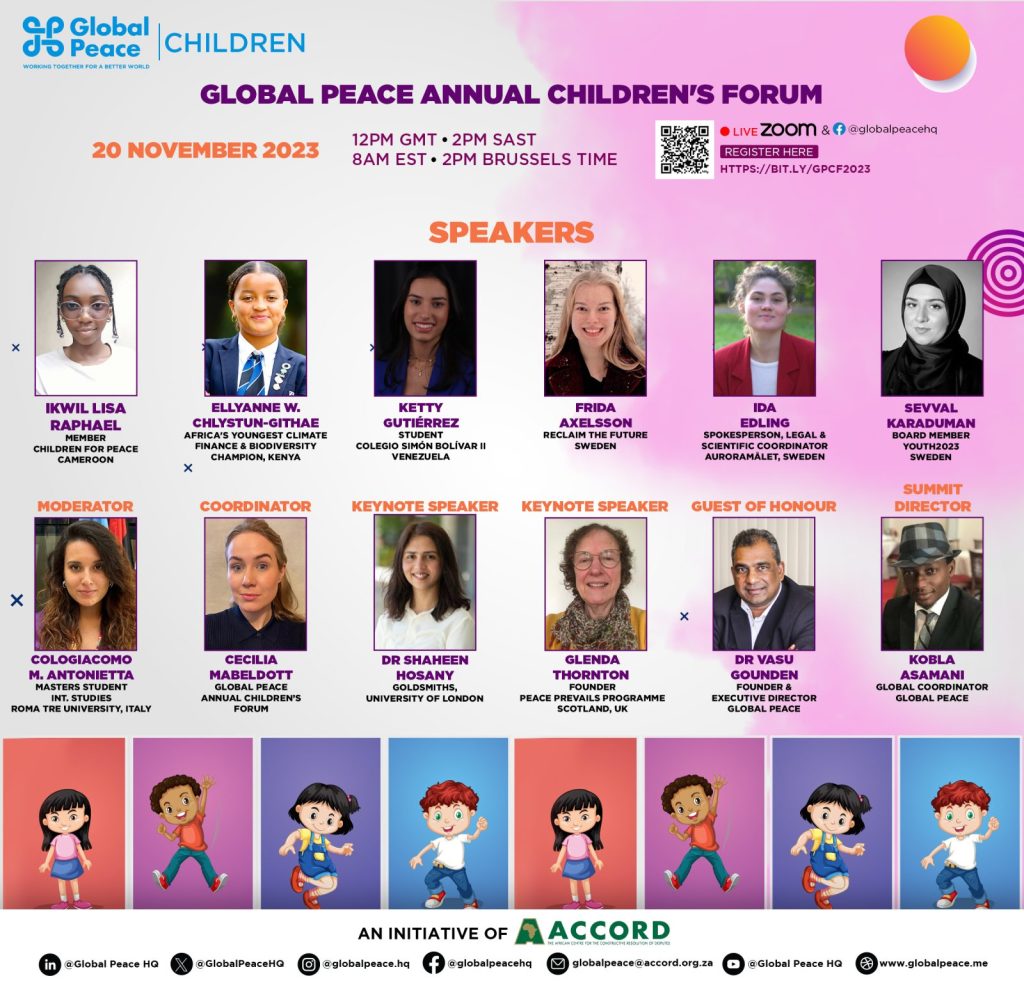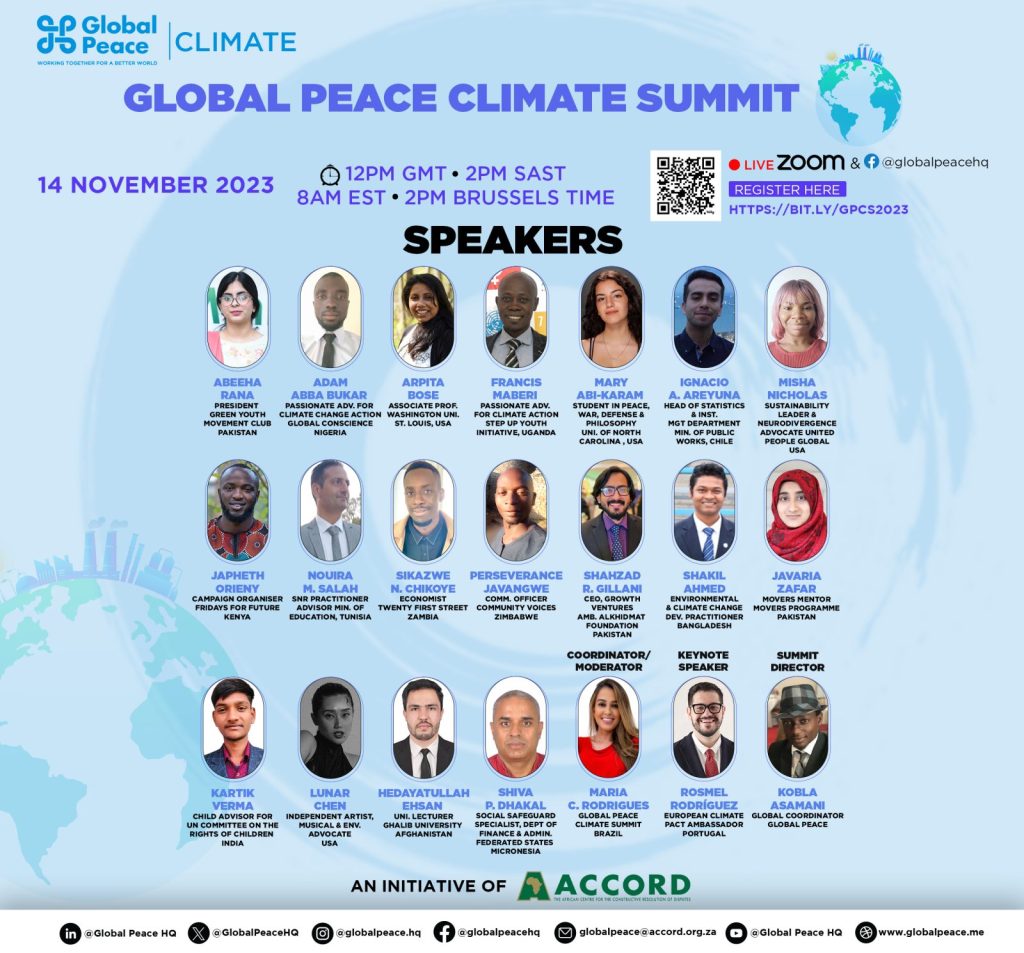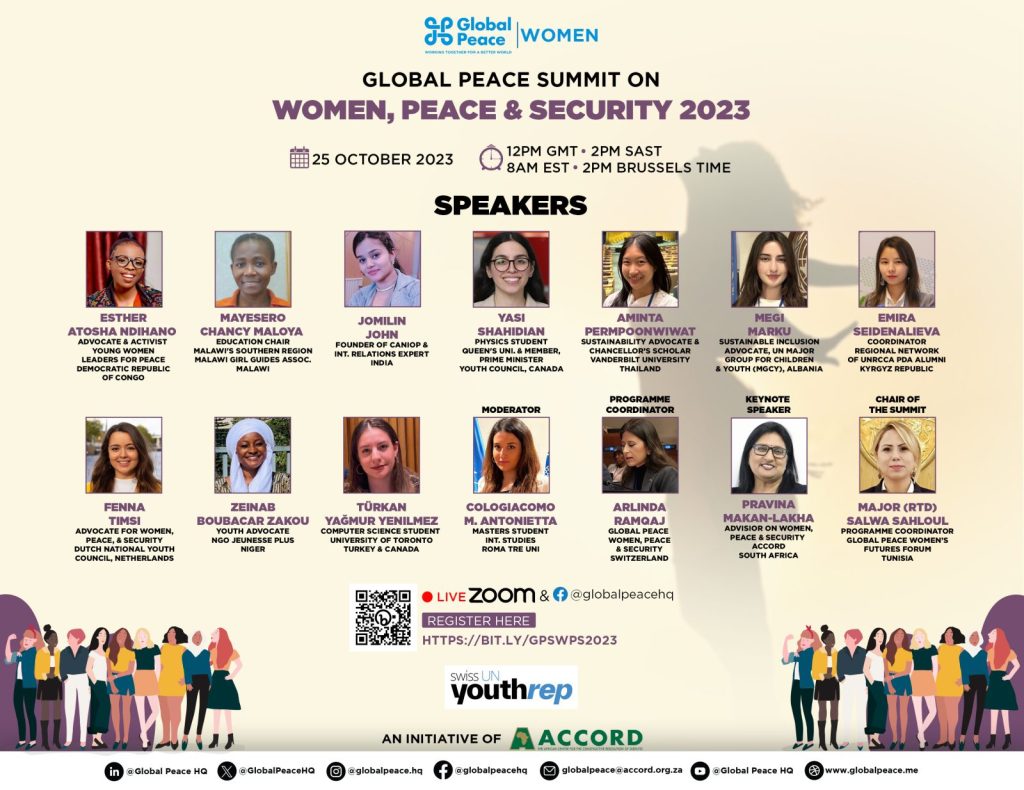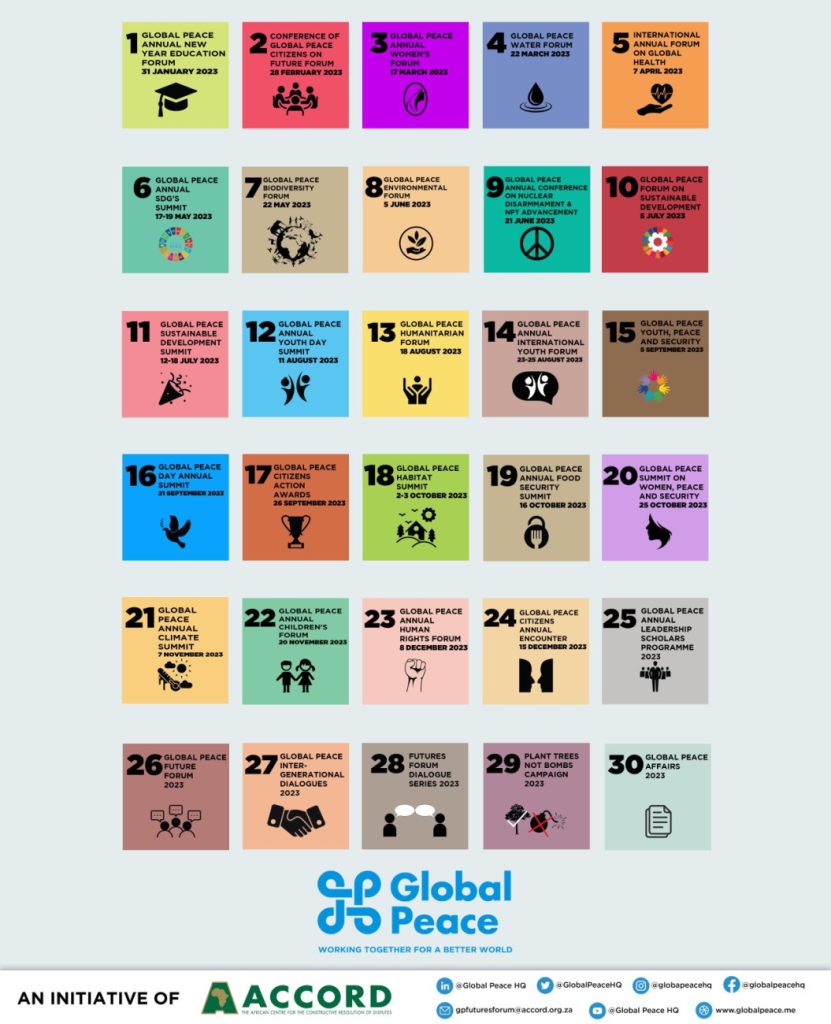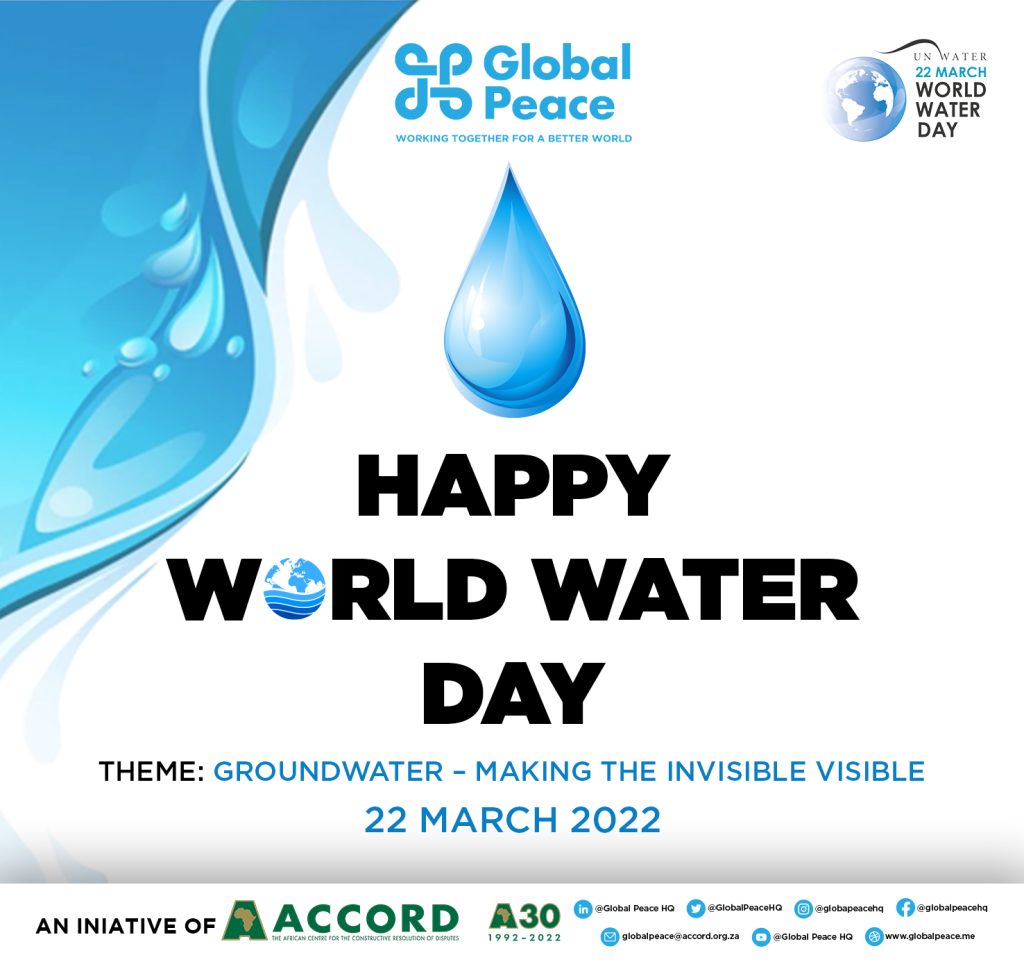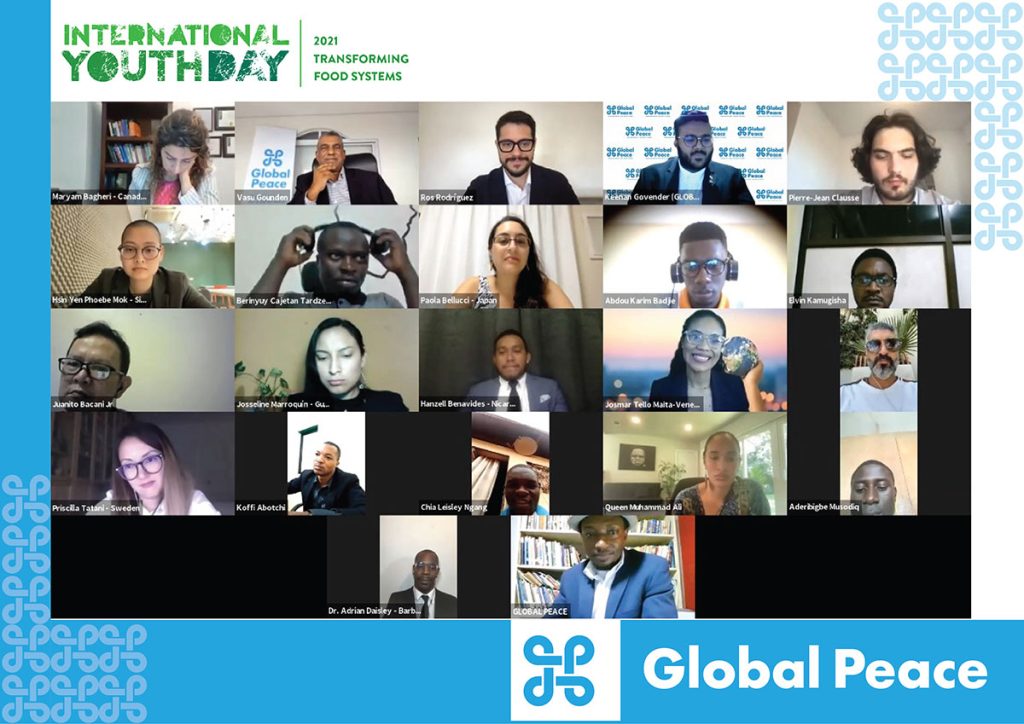On 28 July 2023, Global Peace launched the Global Peace Thematic Working Group on the Future of Education on the theme “Solutions today for tomorrow’s world”. Building upon the momentum that has been created through the Global Peace Intergenerational Dialogues and other Flagship programmes, Global Peace inaugurated the Futures Forum initiative for the amplification of the voices of young leaders and partners’ pioneering innovative solutions to the world’s most significant problems. The launch of the Global Peace Futures Forum Thematic Working Group on the future of Education is designed for members to conduct desktop research, using books, journal articles, newspaper sources, questionnaires, surveys, polls, and interviews to gather data.
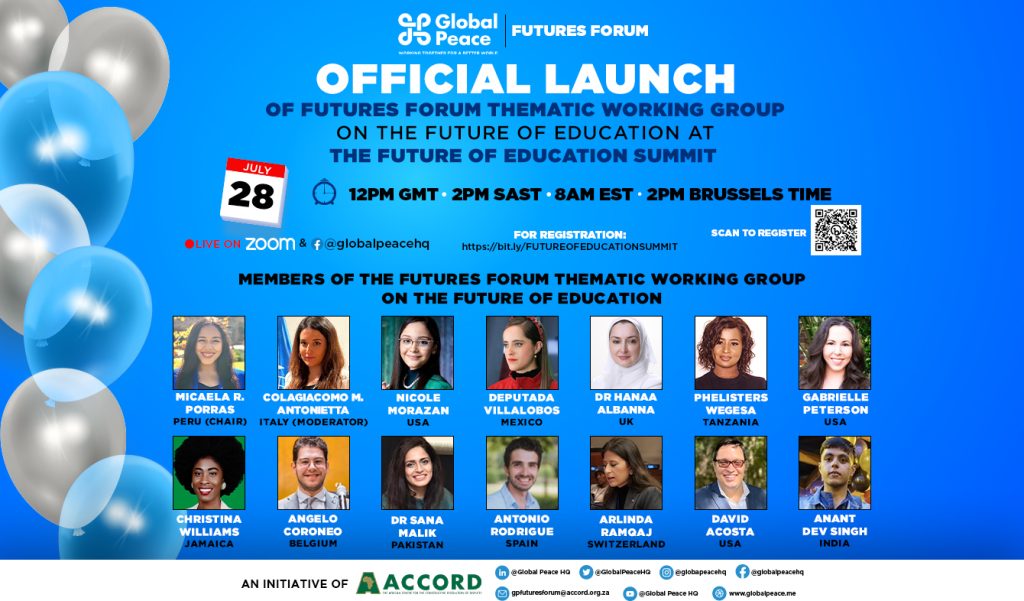
Members of the Global Peace Futures Forum Thematic Working Group on the future of Education are expected to analyse and interpret patterns and trends, record findings by taking written notes and using appropriate software, maintaining and protecting electronic databases and anticipating research issues and promptly resolving them. 15 young people comprising students, youth leaders, academics, civil society, influencers, young diplomats and other stakeholders were selected to undertake this year long voluntary exercise that will culminate into presenting the final report at the Summit of the Future at the UN in 2024. This is will seek to explore at all levels the engagement of young leaders with stakeholders in government, the private sector, academia, and civil society, on topical issues that directly impact on the well-being, livelihoods, and the future of youth; generating new ideas and innovation for collective action towards the future advancement of Education.
THE GLOBAL PEACE FUTURE’S FORUM
The UN Deputy Secretary-General Amina Mohammed launched the Global Peace Futures Forum in 2021. At the launched, the UN Deputy Secretary-General Amina Mohammed underscored that “The UN Charter states ‘We the people’ but it is the faces of young people that we need to see, youth need to define who is the WE! We need young people’s energy, commitment and leadership.” On the need to define the meaning of ‘partnership’ for young people, Ms. Mohammed stated, “Today we have a cohort of young people who have never been better connected – we have leadership now! We can better define what partnership means. Individually and collectively, we can make the change.

Innovative ideas, strategic thinking, in addition to urgent collaborative action play a determining role in order to harness the untapped creativity and innovation essential to conceive practical, implementable, efficient and economical solutions to challenges, which exhibit ‘global’ effects. Brilliant young leaders with the capacity to solve problems should be provided greater opportunities to spearhead this transformation towards a sustainable future.

The Futures Forum strives to give a greater say to young leaders and innovators by facilitating the communication of their concerns and undertakings, forging new partnerships, and ultimately becoming the driving force in shaping the world of tomorrow.
THE GLOBAL PEACE FUTURES FORUM THEMATIC WORKING GROUP
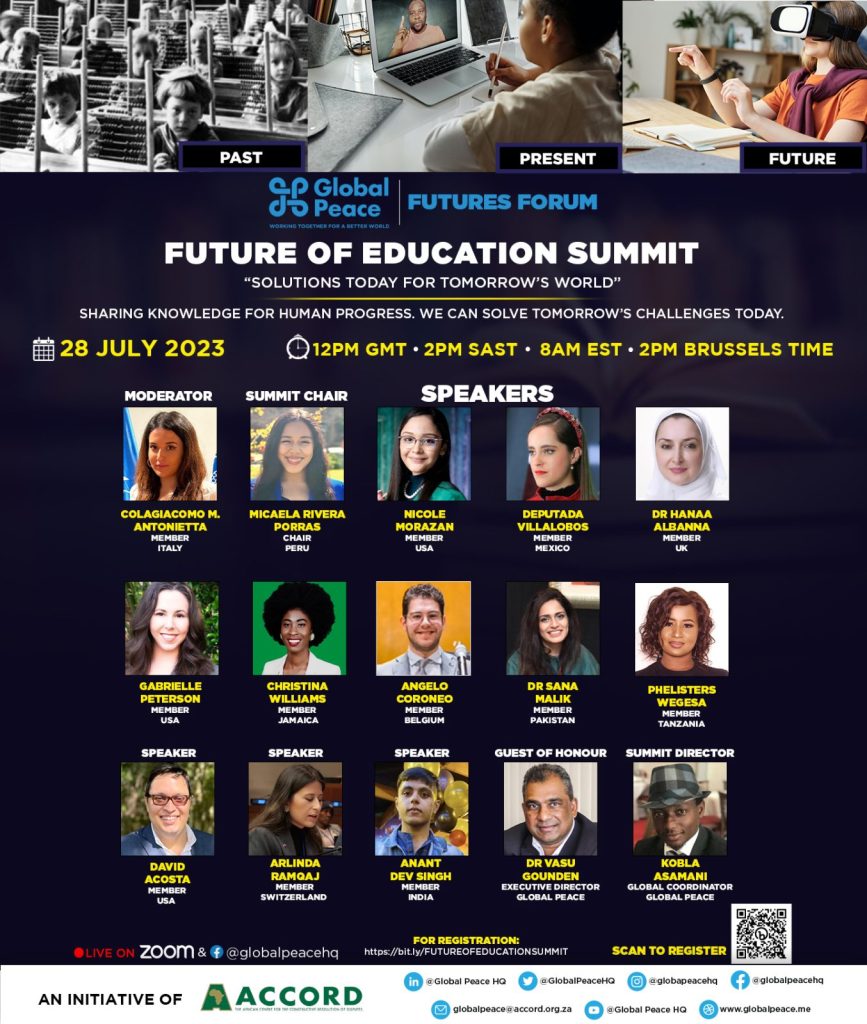
Building upon the momentum that has been created through the Global Peace Intergenerational Dialogue and other Flagship programmes, the Global Peace secretariat inaugurated the Futures Forum initiative for the amplification of the voices of young leaders and partners’ pioneering innovative solutions to the world’s most significant problems.
This youth-led initiative would facilitate the engagement of young leaders with stakeholders in government, the private sector, academia, and civil society on topical issues, which have a direct impact on the wellbeing, livelihoods, and future of the youth; for generation of ideas on innovation, collective action and proposed solutions to global issues. Our young people are heading into the future and holding the reins of change. This investment will reap rich dividends, as the youth of today will be the leaders of tomorrow.
The Global Peace Futures Forum Thematic working Group on Education will be conducting desktop research, and using books, journal articles, newspaper sources, questionnaires, surveys, polls, and interviews to gather data. They will analysing and interpreting patterns and trends, Recording findings by taking written notes and using appropriate software, maintaining and protecting electronic databases and anticipating research issues and promptly resolving them. The Global Peace Futures Forum Thematic working Group on Education will further be prompted in reporting any problems to the relevant stakeholders, following a strict code of ethics and protecting any confidential information at all times, writing proposals and delivering presentations when required, as well as engage in publication on works done by the group.
The Members of the Global Peace Futures Forum Thematic working Group on Education must be versatile and have a sound understanding of research, be proficient in MS Office, must have the ability of a strong problem-solving skills, practical experience in database management, attention to detail and exceptional written, verbal, and telephonic communication skills. The group will be resourceful to demonstrate excellent time management skills.
THE FUTURE OF EDUCATION
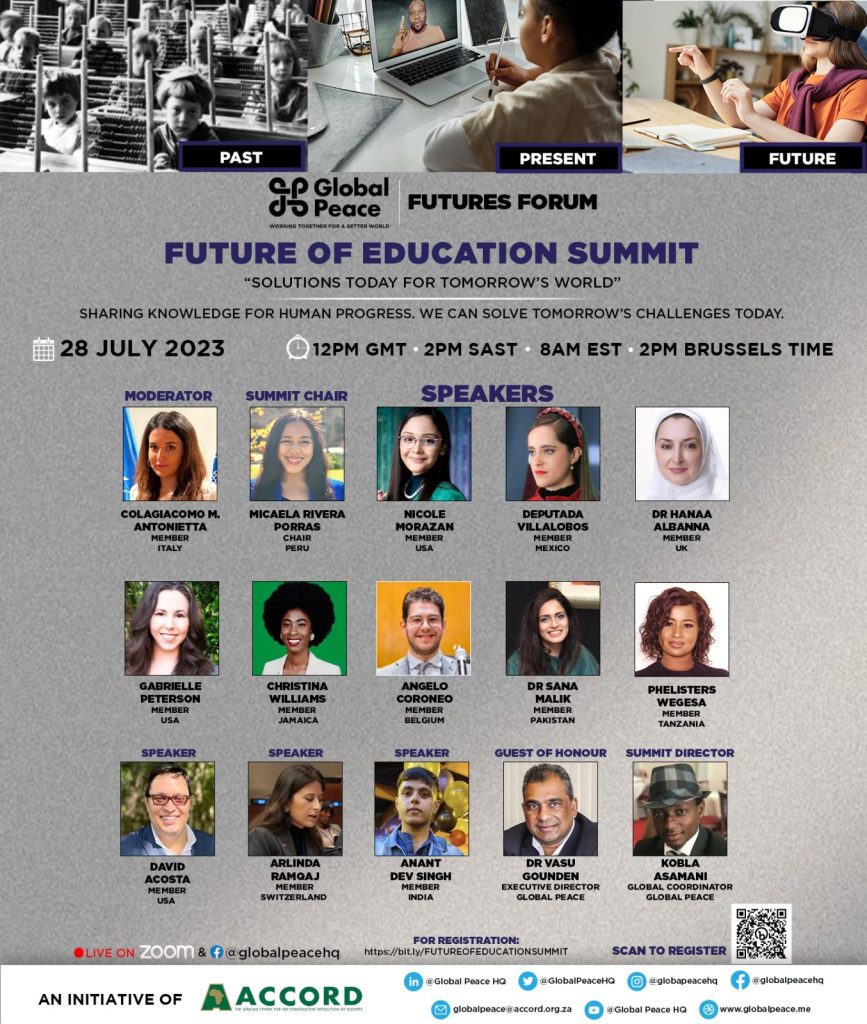
After the last few years that involved a global pandemic, school closures, nationwide remote instruction, protests for racial justice, and an election, the role of education has never been more critical or more uncertain. After the Covid 19 what is or what will education look like now — and what should it aspire to?
As much as the pandemic isolated individuals, on the global scale, people have looked to connect with each other to find solutions and share ideas as they faced a common challenge. The years ahead is expected to bring everyone together and allowed for exchange of ideas, policies, practices, and assessments across boundaries. As educators and leaders create, design, and imagine the future, technology should be used in service of that vision rather than dictating it. As technology becomes a major part of how we communicate and share ideas, educators need to think critically about how to deploy technology strategically. Technology should always be used in the service of our human purpose and interest. For teachers, Human connections and interactions are at the heart of education.
Education is a human right, a public good and a public responsibility. The United Nations General Assembly has proclaimed 24 January as International Day of Education, in celebration of the role of education for peace and development. Without inclusive and equitable quality education and lifelong opportunities for all, countries will not succeed in achieving gender equality and breaking the cycle of poverty that is leaving millions of children, youth and adults behind. Today, 244 million children and youth are out of school, and 771 million adults are illiterate. Their right to education is being violated and it is unacceptable. It is time to transform education.
Upon ratification of the ‘Transforming our World: the 2030 Agenda for Sustainable Development’ at the 70th United Nations General Assembly session in September 2015, a consensus emerged within the international community that progress towards a sustainable future must be treated as a matter of utmost importance for all inhabitants of this planet, with a special emphasis on younger generations. The 2030 Agenda identified young people as critical agents for change due to their infinite capacities for activism in the creation of a better world. Across the globe, young people are steering innovation, transforming new initiatives into practice, and contributing fresh ideations and energy, all the while possessing massive intellectual potential. This contemporary generation is the most well informed, educated, and connected generation in human history. Their skills, creativity, and enthusiasm uniquely position them to undertake transformational reforms across multiple societal sectors.
THE 2024 SUMMIT OF THE FUTURE – MULTILATERAL SOLUTIONS FOR A BETTER TOMORROW
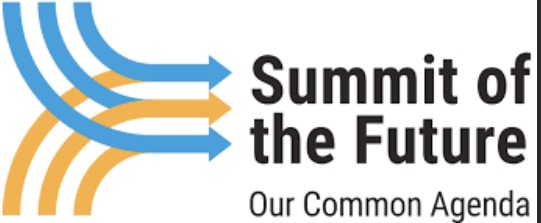
Major global shocks in recent years – including the COVID-19 pandemic, the Ukraine war, and the triple planetary crisis, among others – have challenged our international institutions. Unity around our shared principles and common goals is both crucial and urgent. The Summit of the Future is a once-in-a-generation opportunity to enhance cooperation on critical challenges and address gaps in global governance, reaffirm existing commitments including to the Sustainable Development Goals (SDGs) and the United Nations Charter, and move towards a reinvigorated multilateral system that is better positioned to positively impact people’s lives. Building on the SDG Summit in 2023, Member States will consider ways to lay the foundations for more effective global cooperation that can deal with today’s challenges as well as new threats in the future.


